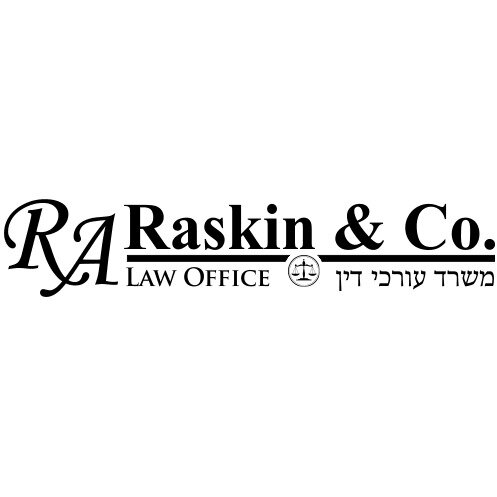Best State, Local, and Municipal Law Lawyers in Israel
Share your needs with us, get contacted by law firms.
Free. Takes 2 min.
Or refine your search by selecting a city:
List of the best lawyers in Israel
About State, Local, and Municipal Law in Israel
State, Local, and Municipal Law in Israel governs the various aspects of governance and administration on state-wide, local, and municipal levels. It regulates the responsibilities and powers of local authorities, such as cities and towns, and how they interact with state laws. These laws encompass areas including urban planning, zoning, local taxation, public services, and community welfare. The framework aims to ensure that local governments can efficiently provide essential services and uphold the welfare of their communities while adhering to national legislation and policies.
Why You May Need a Lawyer
There are multiple scenarios where individuals or businesses might require legal assistance in State, Local, and Municipal Law in Israel:
- Zoning and Building Permits: Understanding and disputing zoning regulations or obtaining necessary building permits for construction projects.
- Property Taxes and Valuation: Challenges related to local property tax assessments and valuation disputes.
- Municipal Ordinances: Navigating violations of local ordinances or understanding compliance requirements.
- Land Use Disputes: Resolving disputes over land use, including preservation of open spaces and residential development issues.
- Public Services: Legal challenges regarding access to public services or disputes over local government decisions affecting community services.
Local Laws Overview
Here are some key aspects of local laws in Israel relevant to State, Local, and Municipal Law:
- Municipal Authorities: Local municipalities have significant responsibility for managing urban planning, road maintenance, sanitation, and education within their jurisdictions.
- Planning and Building Law: Regulates the development and construction processes, ensuring that urban development adheres to national and local plans.
- Local Government Ordinance: Defines the structure, powers, and responsibilities of local councils and mayors within their regions.
- Property Taxation: Local authorities levy taxes on properties, with rates and assessments adhering to national guidelines but implemented locally.
- Public Participation: Emphasizes the community's role in municipal decision-making, ensuring transparency and participation in public affairs.
Frequently Asked Questions
What is the role of local municipalities in Israel?
Local municipalities in Israel manage urban planning, infrastructure, education, sanitation, and local economic development, serving as the primary administrative units for local governance.
How do I contest a property tax assessment?
If you believe your property tax assessment is inaccurate, you can file an appeal with the local assessment committee, providing evidence to support your claim for reassessment.
What is a building permit, and how do I obtain one?
A building permit is required for any new construction or significant alterations to a structure. You must submit architectural plans to the local planning committee for approval to obtain one.
Can local laws override national laws?
No, local ordinances must comply with national legislation. However, local authorities have the power to enforce and interpret these laws within their jurisdictions.
How are zoning regulations determined?
Zoning regulations are established by local planning committees according to national guidelines, considering land use plans, environmental concerns, and community needs.
What steps are involved in resolving a land use dispute?
Land use disputes can often be resolved through negotiation or mediation. If those methods fail, legal proceedings may be necessary, involving a review by planning committees or courts.
What is the Planning and Building Law?
The Planning and Building Law regulates land use and construction, ensuring orderly development, environmental protection, and compliance with national and local plans.
Are there any protections for tenants in municipal law?
Yes, tenants and landlords are subject to national tenancy laws, but local municipalities may impose additional regulations affecting rental agreements and property maintenance.
How do municipal elections work in Israel?
Municipal elections are held every five years. Residents vote for a mayor and local council members, who are responsible for local governance and policy implementation.
How can I influence local municipal decisions?
Citizens can participate in public hearings, submit petitions, attend council meetings, or engage in municipal boards to influence local government decisions.
Additional Resources
Consider reaching out to the following resources for additional guidance on State, Local, and Municipal Law:
- Israeli Ministry of Interior: Provides information on local governance and municipal regulations.
- Local Government Economic Services Ltd. (LGES): Offers support to municipalities in Israel for economic development.
- Israeli Bar Association: Can help you find legal professionals specializing in municipal law.
- Planning and Building Committees: Offer specific guidance on zoning and planning issues within different regions.
- Civic Engagement Organizations: These groups promote public participation and transparency in local government. Engaging with them can provide further insights and support.
Next Steps
If you need legal assistance in State, Local, and Municipal Law in Israel, consider taking these steps:
- Identify the Issue: Clearly define your specific legal issue or question related to state, local, or municipal law.
- Consult Professionals: Seek advice from a lawyer specializing in municipal law for specific legal advice or case evaluation. The Israeli Bar Association can aid you in finding the appropriate lawyer.
- Research and Engage: Utilize available resources, governmental bodies, and civic organizations to gather relevant information and support.
- Prepare Documentation: Collect and organize any essential documents related to your legal issue, such as permits, tax assessments, or property deeds.
- Engage with Local Authorities: Communicate with relevant local government offices or committees to address your concerns directly where applicable.
Lawzana helps you find the best lawyers and law firms in Israel through a curated and pre-screened list of qualified legal professionals. Our platform offers rankings and detailed profiles of attorneys and law firms, allowing you to compare based on practice areas, including State, Local, and Municipal Law, experience, and client feedback.
Each profile includes a description of the firm's areas of practice, client reviews, team members and partners, year of establishment, spoken languages, office locations, contact information, social media presence, and any published articles or resources. Most firms on our platform speak English and are experienced in both local and international legal matters.
Get a quote from top-rated law firms in Israel — quickly, securely, and without unnecessary hassle.
Disclaimer:
The information provided on this page is for general informational purposes only and does not constitute legal advice. While we strive to ensure the accuracy and relevance of the content, legal information may change over time, and interpretations of the law can vary. You should always consult with a qualified legal professional for advice specific to your situation.
We disclaim all liability for actions taken or not taken based on the content of this page. If you believe any information is incorrect or outdated, please contact us, and we will review and update it where appropriate.
Browse state, local, and municipal law law firms by city in Israel
Refine your search by selecting a city.
















